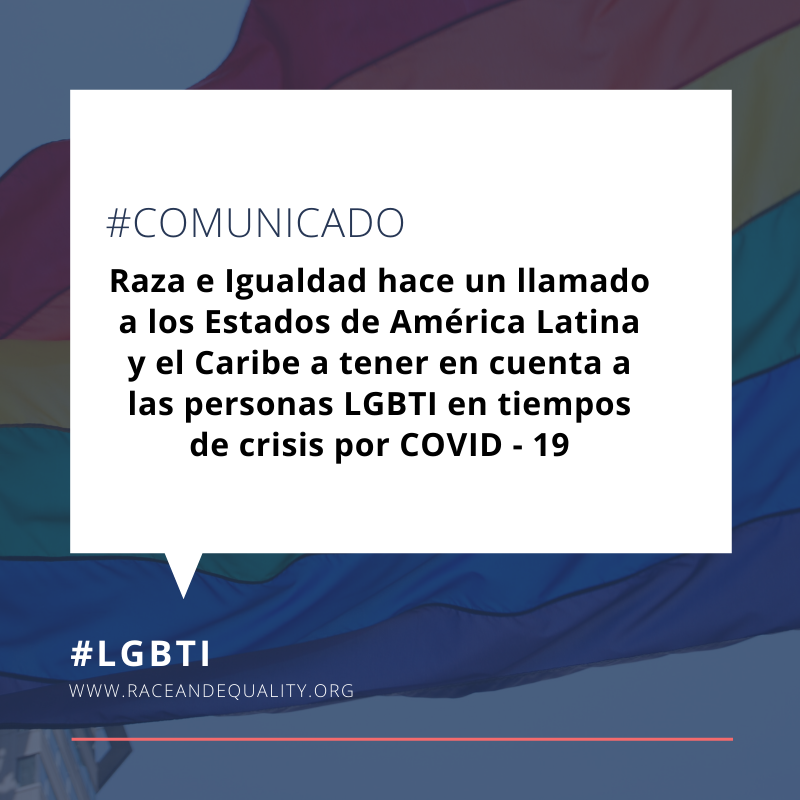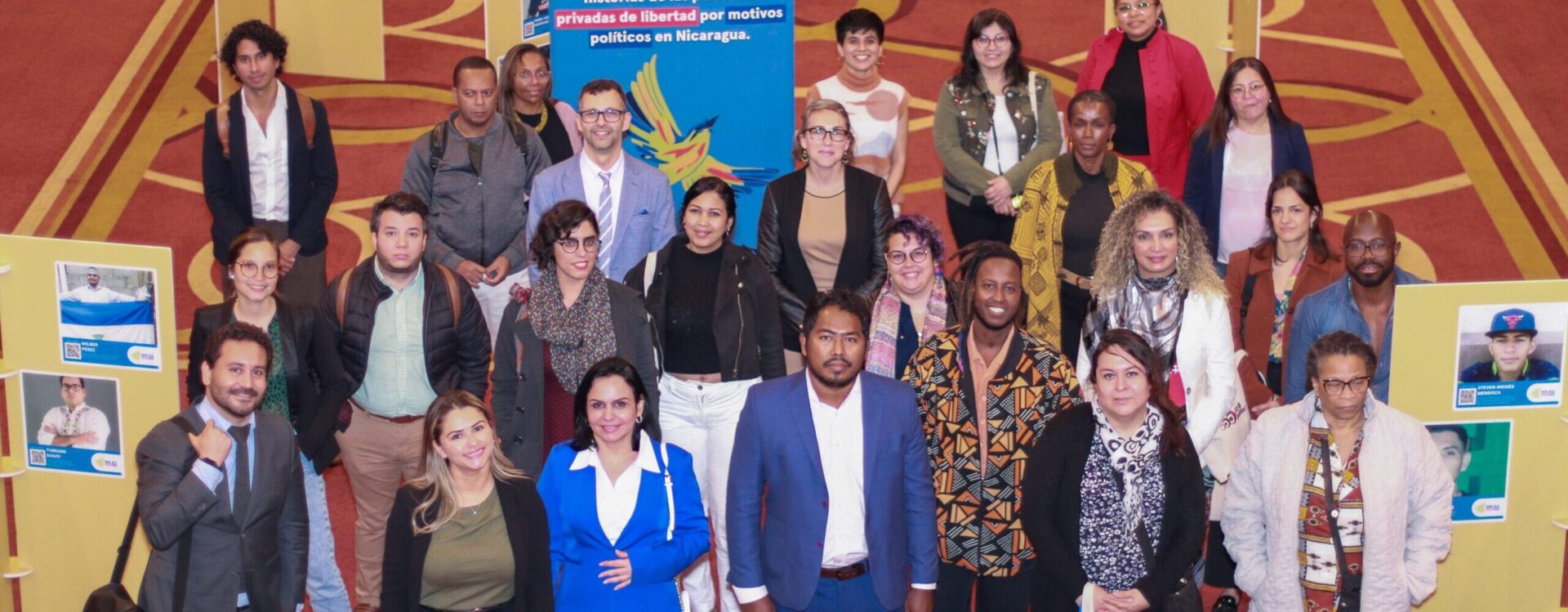Raza e Igualdad hace un llamado a los Estados de América Latina y el Caribe a tener en cuenta a las personas LGBTI en tiempos de crisis por COVID – 19
In the face of the of the recent crisis, caused by the COVID-19 pandemic, the International Institute on Race, Equality and Human Rights (Race and Equality) reminds States of the […]

In the face of the of the recent crisis, caused by the COVID-19 pandemic, the International Institute on Race, Equality and Human Rights (Race and Equality) reminds States of the importance of safeguarding the health of the entire population regardless of sexual orientation or gender identity; Public policies that encompass the crisis must be thought of from intersectional approaches that address gender and human rights perspectives.
Race and Equality warns about the differential impact on rights that crises like these can have on historically marginalized and socially vulnerable populations such as LGBTI people. “The social reality of LGBTI people in Latin America and the Caribbean is characterized by precarious access to health services, education, work and comprehensive well-being, realities that must be considered by the States when designing virus containment strategies,” says Zuleika Rivera, LGBTI Program Officer at Race and Equality.
«The state of alert starts precisely because, although these measures affect the entire social group, those who have always lived in a state of vulnerability, tend to be mostly affected. For example, trans women sex workers are very affected by the strategies that are being used so far, especially because in order to eat and pay rent in the place where they live, they must work, which not only puts them at risk, but a whole social group in imminent risk, ” she continues.
The situation in Latin America
LGBTI civil society organizations in Latin America and the Caribbean expressed to us their concern about the containment strategies used by States without taking into account differential and rights-based approaches.
In Peru, for example, they have expressed concern about the impacts of the measures taken so far by the State to prevent the spread of the virus. These strategies impact LGBT people who mostly live from informal work, as is the case of the trans population. In addition, the self-financing of trans and LGBTI foster homes is in danger. “If the LGBTI population has to continue working or needs treatment for HIV / AIDS, how are they going to mobilize? Or if someone gets sick who guarantees that they will not be discriminated against because of their sexual orientation or gender identity? ” added Santiago Balvín, an independent trans rights activist.
On the other hand, Peruvian LGBTI organizations have shown concern about the actions of Congress and what that may mean for LGBTI rights in the country, since it is a time when the rights of said population could be limited.
In the Dominican Republic, the trans organization TRANSSA has expressed uncertainty because the State has not declared a national emergency, which puts the lives of many people in the country at risk, including LGBTI people. Likewise, they pointed out that the LGBTI population with informal or independent work will be the most affected if a curfew or a national quarantine is decreed, then highlighting the state of collective panic over the disinformation in the networks about COVID-19. They also have shown concern about access to health for the population with HIV / AIDS.
In Brazil, many of the same worries were expressed by civil society organizations who explain that the State has not taken any serious action to prevent the spread of the virus and has not recommended or imposed any type of quarantine.
Given racial inequality within the country, the Afro-descendant population can suffer more serious impacts in relation to COVID-19, since they live in situations of great precariousness and are the most dependent on the health system. Many of these populations live in favelas, removed from their homes, without access to water or health, or are sex workers. Some communities have been without clean water or basic sanitation for weeks. “Mental health is another serious concern as many struggle with anxiety or depression or have a higher tendency to develop anxiety or depression, and given all the information on social media, it could lead to an increase in episodes of mental health, not to mention the detrimental effects of isolation and confinement ”pointed out, among other things, Bruna Benavides, secretary of the political coordination of the National Association of Transvestites and Transsexuals, ANTRA.
Some local organizations, such as ANTRA, have published recommendations for trans people who work in the informal labor market at the following link: https://antrabrasil.org/cartilhas/
In the case of Colombia, the exponential growth of the confirmed cases of people carrying COVID-19 is worrisome.[1] Although the National Government has enacted measures related to the closure of maritime and ground borders, and has promoted measures for education and work from homes to promote isolation, the lack of social and economic measures that take into account the conditions =of the most marginalized and vulnerable population is still troublesome.
In Cuba, uncertainty regarding the actions that the government may take continues. To date, no state of emergency or quarantine has been declared. Citizens are concerned that the government is not taking drastic measures to prevent the spread of COVID-19, and that there is no focus on self-responsibility and self-care about preventive measures that citizens can take.
Recommendations to States
Race and Equality and our counterparts call on the States of the region, and in accordance with the curfew measures that have been declared in some areas of the region, request the surveillance and protection of the human rights of those who could be most affected by these events that could affect their lives and personal integrity.
Likewise, we urge states to include LGBTI populations in their national plans to combat COVID-19 taking into account the differential impact of the crisis and to continue informing the population about the progression of the virus, as well as the services available for this population’s particular needs.
We call on States to protect the economic income of the poorest households[2] and those unable to telework; measures that allow the flexibility of payments of bank and financial obligations; policies that guarantee adequate treatment and protection for people over 60 years of age, especially those belonging to the LGBTI[3] sectors, and measures that ensure access to sanitary conditions to prevent the spread of the virus, such as access to public toilets, especially for migrants, sex workers, the homeless, and imprisoned people[4].
Additionally, we call on States not to use the health crisis to implement legislation that limits or presents setbacks in the area of human and LGBTI rights.
We call on the
LGBTI population to follow the recommendations of the Ministry of Health and
the WHO, remain calm, and apply preventive measures.
[1] As of March 19, 2020, at 12:00 noon, 93 cases of people carrying COVID-19 have been registered, according to figures from the Ministry of Health.
[2] LGBT people often face poverty, social exclusion, and lack of access to housing. LGBT people are often expelled from their families and schools, and in some cases they cannot even get jobs that pay the minimum wage. This situation could push them towards the informal economy or criminal activity.
[3] The lack of family support and social rejection accentuate the conditions of loneliness, isolation, poverty, and lack of access to housing and health services for LGBTI elders.
[4] «Inmates of La Picota protest against measures against the coronavirus (Covid-19)» https://www.wradio.com.co/noticias/bogota/internos-de-la-picota-protestan-por-medidas-contra-el-coronavirus-covid19/20200318/nota/4023683.aspx

